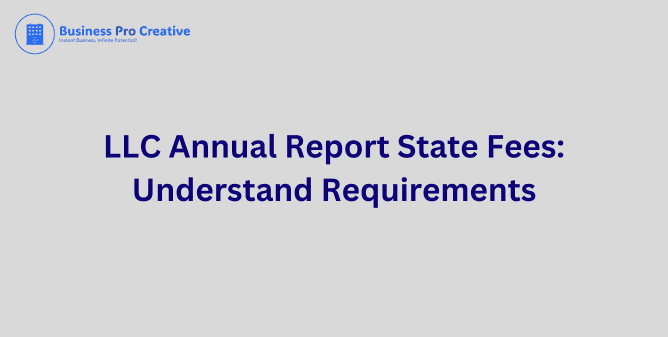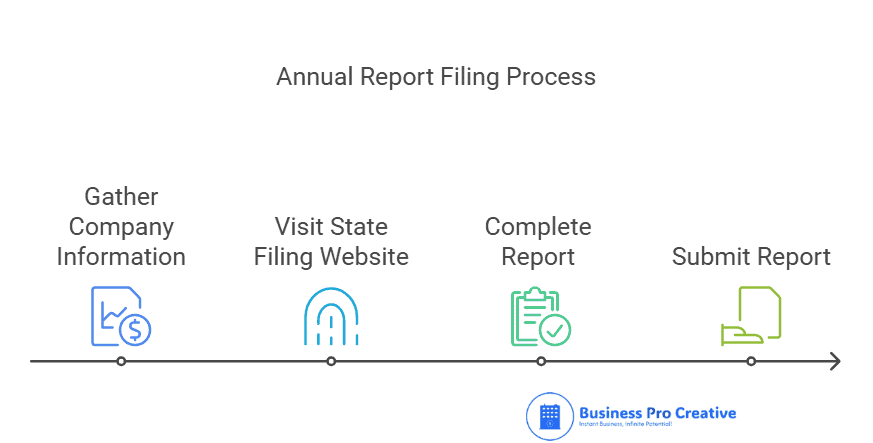
LLC annual reports are mandatory state filings that maintain your company’s active status and compliance, with fees varying considerably by jurisdiction. While New York charges just $9, California requires $800-$900, and Delaware sets a $300 fee. Filing frequencies differ between annual and biennial requirements, with specific deadlines varying by state – such as Delaware’s June 1 deadline or California’s last-day-of-formation-month requirement. Non-compliance can result in penalties, administrative dissolution, and loss of liability protection, making it vital to understand and track your state’s specific requirements. Proper management of these obligations guarantees continued business protection and good standing.
What Is An LLC Annual Report?
An LLC Annual Report serves as a mandatory state filing that guarantees businesses maintain their active status and compliance with state regulations. These reports help state agencies track essential company information, including ownership details, registered agent information, and principal business address changes throughout the year.
Why Are These Reports Necessary for Maintaining Compliance?
Limited liability companies must file annual reports to maintain their good standing with state authorities and preserve their legal status. These reports serve multiple compliance benefits by guaranteeing business transparency and maintaining accurate public records of company information.
Regular reporting demonstrates financial accountability and fulfills important legal obligations to state agencies.
Annual reports help states monitor active businesses, verify significant company details, and maintain updated records of registered business entities. This reporting accuracy protects both the business and the public by providing verified information about company ownership, registered agents, and principal business locations.
States use these reports to confirm businesses meet ongoing requirements and maintain proper documentation, which is essential for protecting the company’s limited liability status and continuing business operations legally.
How Do State-Specific Requirements Vary?
State requirements for LLC annual reports can vary greatly across jurisdictions, with each state maintaining its own distinct set of rules, deadlines, and filing procedures. The variations encompass filing frequencies, report templates, compliance penalties, and fee structures that businesses must carefully navigate to maintain good standing.
Understanding state differences is essential for multi-state operations, as report names and requirements differ markedly. While some states mandate annual submissions, others require biennial filings or have specific due dates based on formation dates. Penalties for non-compliance vary from modest late fees to potential administrative dissolution.
What Are The State Fees For Annual Reports?
Annual report fees for LLCs represent a significant operational expense that varies dramatically across different states, ranging from as low as $0 in states like South Carolina to over $800 in California.
Understanding these state fees and compliance requirements is essential for proper business planning and budgeting.
The filing costs typically include both basic reporting fees and potential franchise taxes, with reporting frequency varying by jurisdiction. Notable examples include Delaware’s $300 annual report fee plus franchise tax, Nevada’s $150 filing fee, and New York’s $9 filing fee with additional publication requirements.
When considering the best states to form an LLC, Delaware, Nevada, and Wyoming often stand out due to their business-friendly environments
Below are the filling frequencies and fee ranges for each state in the USA.
| State | Filing Frequency | Fee Range |
|---|---|---|
| Alabama | Annually | $100 – $150 |
| Alaska | Annually | $100 – $200 |
| Arizona | Annually | $50 – $85 |
| Arkansas | Annually | $150 |
| California | Annually | $20 – $800 |
| Colorado | Annually | $10 – $50 |
| Connecticut | Annually | $80 |
| Delaware | Annually | $300 |
| Florida | Annually | $138.75 |
| Georgia | Annually | $50 |
| Hawaii | Annually | $15 |
| Idaho | Annually | $0 – $20 |
| Illinois | Annually | $75 |
| Indiana | Annually | $50 |
| Iowa | Annually | $45 |
| Kansas | Annually | $50 |
| Kentucky | Annually | $15 |
| Louisiana | Annually | $30 – $45 |
| Maine | Annually | $85 |
| Maryland | Annually | $300 |
| Massachusetts | Annually | $500 |
| Michigan | Annually | $25 |
| Minnesota | Annually | $0 – $135 |
| Mississippi | Annually | $25 |
| Missouri | Annually | $45 |
| Montana | Annually | $20 |
| Nebraska | Annually | $10 |
| Nevada | Annually | $150 – $350 |
| New Hampshire | Annually | $100 |
| New Jersey | Annually | $75 |
| New Mexico | Annually | $50 |
| New York | Annually | $9 |
| North Carolina | Annually | $200 |
| North Dakota | Annually | $50 |
| Ohio | Annually | $25 |
| Oklahoma | Annually | $25 |
| Oregon | Annually | $100 |
| Pennsylvania | Annually | $70 |
| Rhode Island | Annually | $50 |
| South Carolina | Annually | $25 |
| South Dakota | Annually | $50 |
| Tennessee | Annually | $300 |
| Texas | Annually | $0 |
| Utah | Annually | $10 |
| Vermont | Annually | $35 |
| Virginia | Annually | $50 |
| Washington | Annually | $71 |
| West Virginia | Annually | $25 |
| Wisconsin | Annually | $25 |
| Wyoming | Annually | $50 |
Some states offer online filing discounts, while others charge premium rates for expedited processing. Business owners must carefully track these varying deadlines and fees to maintain good standing and avoid costly penalties.
How Often Do I Need To File And What Are The Deadlines?
Filing requirements for LLC annual reports follow different schedules across jurisdictions, with most states mandating either annual or biennial submissions. Understanding state variations in filing frequency and submission timelines is vital for maintaining compliance and avoiding filing penalties.
| State | Filing Frequency | Deadline |
|---|---|---|
| Alabama | Annually | April 15 |
| Alaska | Annually | January 2 |
| Arizona | Annually | Annual Report Due Date |
| Arkansas | Annually | May 1 |
| California | Annually | April 15 |
| Colorado | Annually | Anniversary Month |
| Connecticut | Annually | Annual Report Due Date |
| Delaware | Annually | June 1 |
| Florida | Annually | May 1 |
| Georgia | Annually | April 1 |
| Hawaii | Annually | December 31 |
| Idaho | Annually | End of Anniversary Month |
| Illinois | Annually | First day of the month following LLC formation |
| Indiana | Annually | April 15 |
| Iowa | Annually | April 1 |
| Kansas | Annually | April 15 |
| Kentucky | Annually | June 30 |
| Louisiana | Annually | Anniversary Date |
| Maine | Annually | June 1 |
| Maryland | Annually | April 15 |
| Massachusetts | Annually | Anniversary Date |
| Michigan | Annually | February 15 |
| Minnesota | Annually | December 31 |
| Mississippi | Annually | April 15 |
| Missouri | Annually | May 15 |
| Montana | Annually | April 15 |
| Nebraska | Annually | April 1 |
| Nevada | Annually | Last day of the anniversary month |
| New Hampshire | Annually | April 1 |
| New Jersey | Annually | Anniversary Month |
| New Mexico | Annually | Annually on the anniversary date |
| New York | Annually | Annually on LLC formation date |
| North Carolina | Annually | April 15 |
| North Dakota | Annually | November 15 |
| Ohio | Annually | April 15 |
| Oklahoma | Annually | Anniversary Month |
| Oregon | Annually | Anniversary Date |
| Pennsylvania | Annually | April 15 |
| Rhode Island | Annually | November 1 |
| South Carolina | Annually | Anniversary Month |
| South Dakota | Annually | End of Anniversary Month |
| Tennessee | Annually | Anniversary Month |
| Texas | Annually | May 15 |
| Utah | Annually | Anniversary Month |
| Vermont | Annually | April 1 |
| Virginia | Annually | Anniversary Date |
| Washington | Annually | May 31 |
| West Virginia | Annually | June 30 |
| Wisconsin | Annually | End of Anniversary Month |
| Wyoming | Annually | Anniversary Date |
To guarantee timely submissions, businesses should implement compliance reminders and tracking systems. Many states impose substantial late fees and potential administrative dissolution for missed deadlines, making it essential to monitor and meet state-specific requirements throughout the year.
How Do I File An Annual Report?
Completing an LLC annual report involves a straightforward process that can typically be handled through your state’s Secretary of State website or business portal.

State variations exist in filing methods, but most jurisdictions offer multiple submission options.
Before filing, gather essential document preparation materials, including your LLC’s identification number, registered agent information, and current business details.
Online submissions represent the most efficient filing method, offering immediate confirmation and faster processing. However, many states still accept mail-in or in-person submissions.
For compliance tips, verify all information is accurate and current before submitting.
Most states accept various payment methods, including credit cards, electronic checks, and ACH transfers for online filings, while paper submissions typically require checks or money orders.
What Are The Consequences Of Non-Compliance?
Failing to submit LLC annual reports can trigger serious repercussions that affect your business’s legal status and financial health. The penalties for negligence often include monetary fines, which can accumulate daily until the report is filed. States may impose fees ranging from hundreds to thousands of dollars.
Beyond financial consequences, non-compliance can lead to severe legal repercussions, including business dissolution by the state. Companies risk losing their limited liability protection and other benefits of LLC status.
Additionally, the state may revoke your certificate of good standing, preventing you from conducting business legally, obtaining loans, or entering contracts.
Reputation damage can also occur when potential clients, partners, or lenders discover your non-compliance status through public records. This damage can persist even after resolving the filing issues, affecting future business opportunities.
How Can I Effectively Manage My Annual Reports?
Successfully managing LLC annual reports requires a systematic approach to tracking deadlines and organizing documentation. Implementing effective management strategies, such as compliance checklists and report templates, helps guarantee timely submissions and maintains good standing with state authorities.
Utilizing filing software specifically designed for business compliance can streamline the process by providing automated deadline reminders and document storage. These digital tools often include features like cloud-based filing systems, status tracking, and integration with state filing portals.
Many services can also auto-populate report templates with your LLC’s information, reducing errors and saving time.
To maintain ideal organization, create a centralized system that includes all necessary filing dates, fee schedules, and required documentation. Regular review of these materials helps prevent missed deadlines and keeps your LLC compliant.
